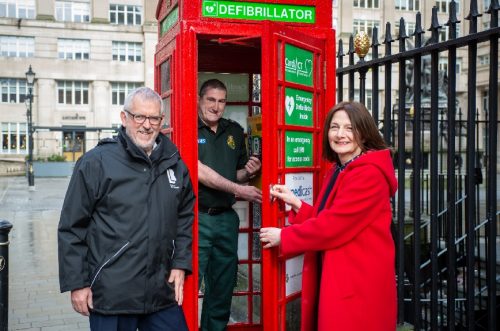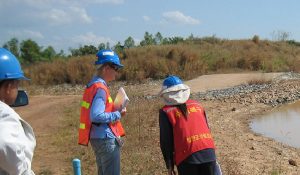Business district telephone box is transformed into life-saving defibrillator

A telephone box in Liverpool city centre has been converted into a life-saving defibrillator, as a campaign to make the city “heart-safe” continues.
The Automated External Defibrillator (AED) will be available 24 hours a day inside the traditional red telephone box outside Liverpool’s Town Hall.
CardiACT is a campaign managed by Liverpool-based health care cash plan provider Medicash, working with the Liverpool BID Company and North West Ambulance Service which is committed to installing defibrillators in key locations across Liverpool.
Launching in 2015, the aim has been to ensure no-one is more than two minutes away from a defibrillator in the commercial district. Evidence shows the chances of survival from a cardiac arrest is 80% if a device is used within that time. Without a defibrillator, the chances of survival reduce to just two per cent.
Since it began, Medicash’s CardiACT campaign has expanded to Halton and is due to launch in Chester later in the year.
This installation within an unused telephone box provides a useful alternative purpose for the old, and largely redundant, pavement furniture.
Medicash chief executive, Sue Weir, said: “The installation of this defibrillator is an important milestone in our campaign.
“It’s a prominent position and its 24-hour accessibility means that, even though there are businesses within Liverpool’s commercial district with a defibrillator installed, there will be no delay to life-saving treatment.
“Re-using these iconic telephone boxes and giving them a new purpose to save lives is a fitting next chapter for CardiACT”.
Bill Addy, chief executive of Liverpool BID Company, said: “We are glad to see how this joint initiative with Medicash is taking a new innovative approach to make our city even safer and possibly serve as a model for many locations across the UK and the World.
“This wouldn’t be possible without the support of Liverpool’s business community and their ongoing commitment to this life-saving initiative continues to inspire me. Lives will be saved in Liverpool because of their support and we are grateful to them.”
Rob Sharples, community resuscitation development officer at North West Ambulance Service, added: “Each year around 100,000 people die from sudden cardiac arrest in the UK. Very often this happens in public places and the two-minute campaign is designed to, quite simply, save lives.”
Medicash has a four-step guide if an individual believes someone has suffered a cardiac arrest:
- Assess the scene safety and tap the person and shout. If there is no response, they are not breathing or gasping, first call 999 and get someone to get an AED
- Begin chest compressions. Give 30 chest compressions, to a depth of two to 2.4 inches, and at a rate of 100 to 120 per minute (two per second)
- Give rescue breaths. Open their airways and give two breaths. Provide cycles of 30 compressions and two breaths
- Turn on the defibrillator. Apply the electrode pads to the bare chest. Follow the visual and voice prompts
For businesses interested in further training for their staff, Medicash’s sister company, Health@Work, can provide a three-hour Qualsafe accredited CPR and AED course.

![ESPN™+[Minnesota Timberwolves Vs Golden State Warriors] Ways To Watch NBA Playoff West Semifinals Game 1 Live Stream [PPV] and TV Channel](https://www.thebusinessdesk.com/northwest/wp-content/themes/thebusinessthemeMKII/assets/images/bg-white.png)





